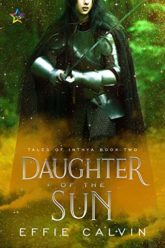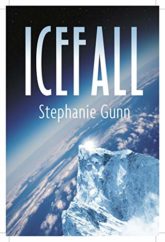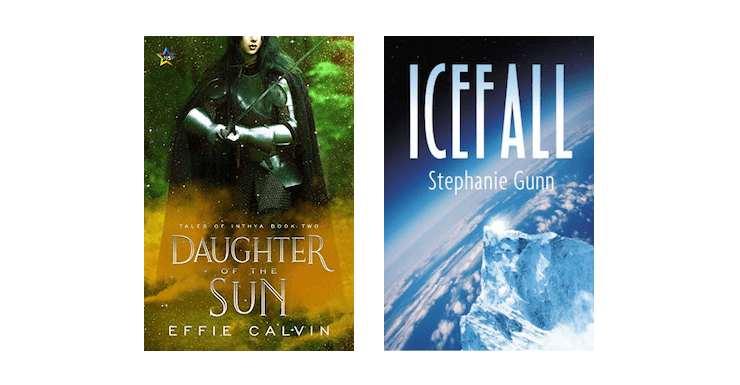This week, I want to talk to you about some utterly delightful (and some tense, strange, even downright unnerving) stories featuring queer women.
Let’s start with a novel, the humorous and playful Daughter of the Sun by Effie Calvin, published by Nine Star Press. Daughter of the Sun is Calvin’s second novel, after The Queen of Ieflaria, and it’s a much more forthrightly humorous work, one with a fine eye for the ridiculous and a deep sense of compassion about human nature, and human (or human-adjacent) weakness.
Buy the Book


Daughter of the Sun
Orsina is a paladin of the Order of the Sun, dedicated to driving out corruption and chaos wherever she finds it. For two years, she’s been fighting monsters and demons and travelling the land, in search of a great evil she’s been told she’s destined to destroy. Even the most noble of paladins would be a little weary, with no sign that she’s any closer to her destiny, or to ever returning home.
Aelia is the Goddess of Caprice—poor choices, worse decision-making. The Order of the Sun classifies her as a chaos goddess, which means her worship is outlawed and the Order’s paladins set themselves against all her works. An encounter with Orsina leaves Aelia trapped in a mortal body, in need of a magical relic to restore herself to the godly power that will let her leave the mortal plane at will. But when Orsina encounters Aelia’s mortal form, she doesn’t recognise the chaos goddess in the body of a bruised, injured mortal woman. She offers Aelia her protection, and in return, Aelia decides that she’ll use Orsina to help her get to a magical relic.
Unfortunately, Aelia’s the goddess of impulsive, reckless, short-sighted decisions. And being in a mortal body seems to be changing her, at least a little. (And in annoying ways: baby goddess’s first hangover!) She develops an attraction for Orsina, one that’s entirely reciprocated. She’s got just enough control not to tell Orsina who she is—Orsina might turn on her, after all—but she wants to. But before she can, the two of them run into one of Aelia’s powerful chaos god brothers, and Aelia’s fate—not to mention Orsina’s—might be out of her own hands.
This is a fun, sweet, and at times hilarious fantasy romance romp. I enjoyed it a lot.
You couldn’t call Iona Datt Sharma’s Penhallow Amid Passing Things (a novelette originally published in the Five Fathoms Press anthology The Underwater Ballroom Society, edited by Stephanie Burgis) hilarious. Nor even really sweet. But it is stunning: set in a place reminiscent of late 18th or early 19th century south-east England, it is a story about the tensions, attraction, and compassion between a smuggler and the honourable, upstanding crown officer who works for the Revenue—and a bit about magic, and about mutual understanding. This is a deft story, eloquent and elegantly written, and I look forward to seeing more of the author’s work in the near future.
Buy the Book


Icefall
Icefall by Stephanie Gunn, a novella published by Twelfth Planet Press, is more towards the “tense, strange and unnerving” end of the interesting-story spectrum. The Mountain on the planet of Icefall is at the story’s centre. No one summits the Mountain. Maggie, a veteran climber, is determined to be the first. Her wife, Aisha, a former climber injured in a mountaineering accident, has always supported Maggie, always believed she’d come back. But Icefall, and the Mountain, don’t let climbers return. The fascination the Mountain exerts is paired with Aisha’s relationship with Maggie and the tensions between them over their life, future, and family, in a story that at times hews as close to horror as it does to science fiction, and staves off tragedy only by the ambiguity—and openness to change—of its ending. It’s a fascinating story, and a compelling one, but it’s one I’m not entirely sure I like.
What are you guys reading lately? I’m in the middle of moving house as I write this, so my reading is all over the place.
Liz Bourke is a cranky queer person who reads books. She holds a Ph.D in Classics from Trinity College, Dublin. Her first book, Sleeping With Monsters, a collection of reviews and criticism, was published in 2017 by Aqueduct Press. It was a finalist for the 2018 Locus Awards and was nominated for a 2018 Hugo Award in Best Related Work. Find her at her blog, where she’s been known to talk about even more books thanks to her Patreon supporters. Or find her at her Twitter. She supports the work of the Irish Refugee Council, the Transgender Equality Network Ireland, and the Abortion Rights Campaign.










